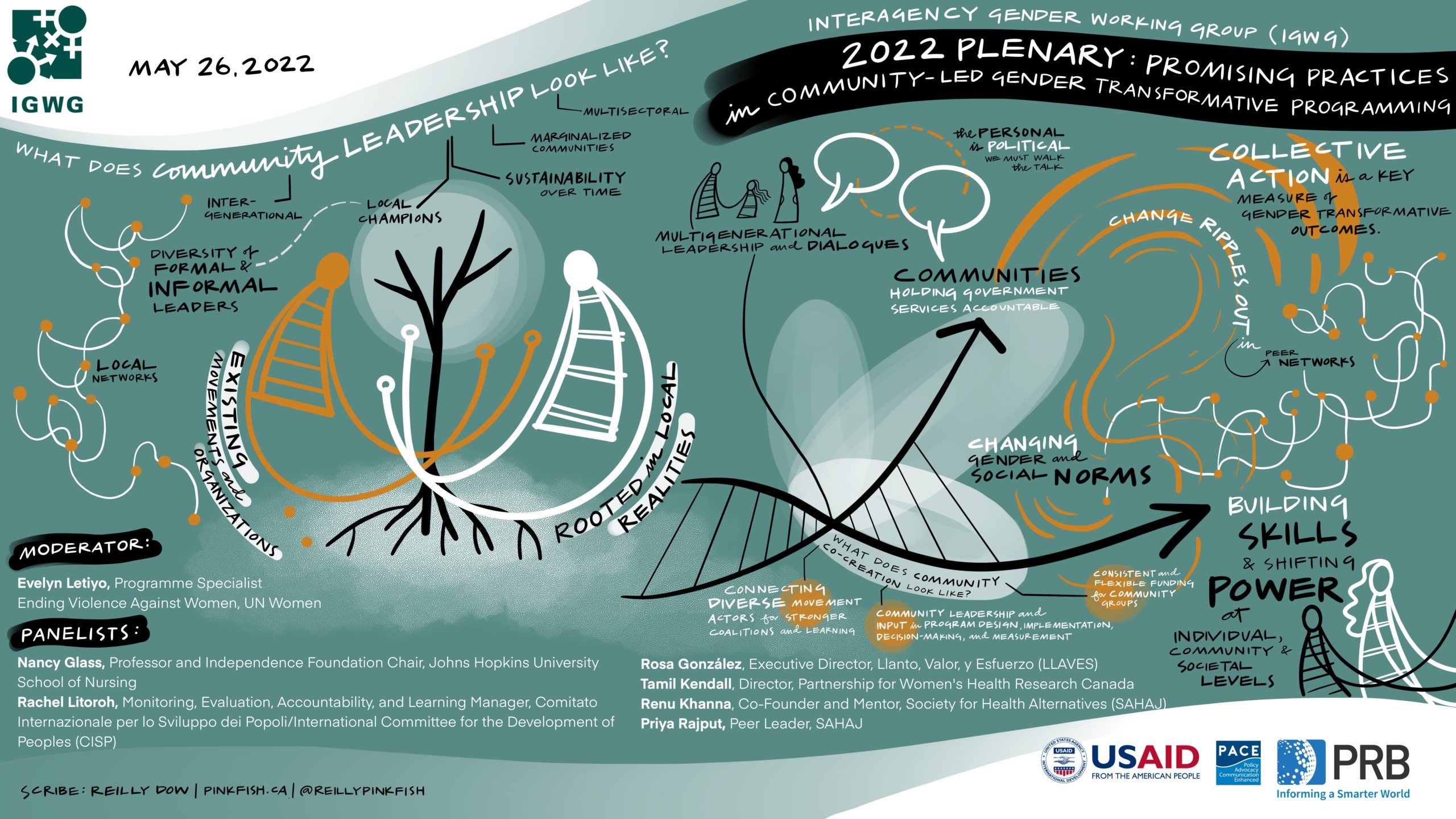Background: The 2022 IGWG Plenary, which took place on May 26, 2022, explored promising practices in community-led gender transformative global health programming, particularly in the contexts of family planning, reproductive health, and gender-based violence prevention. Many gender transformative programs engage communities, but there is wide variability in approaches, which can range from working with formal leaders to hosting group education sessions for community volunteers to mobilizing whole communities through peer outreach. Alternatively, some programs collaborate directly with local social movement actors to advance gender and health programming. There is also much variation in how community mobilization and leadership are defined, the intensity of involvement by community members, and the power dynamics between communities and collaborators. Research into the quality and effectiveness of community interventions in health and gender programs reveals some challenges, including how to build meaningful avenues for community members to provide input on and lead these interventions.
Read the 2022 IGWG Plenary infographic, “How to Effectively Partner With Community Leaders in Gender Transformative Programming,” here.
2022 IGWG Plenary Recording (English)
2022 IGWG Plenary Recording (French)
2022 IGWG Plenary Recording (Spanish)
Event Graphic
During the 2022 IGWG Plenary, a professional visual notetaker captured key takeaways from the discussion in the below graphic.

Event Slides
View slides from the event here.
“Reflections on Community-Led Gender Transformative Programming” Member Video
Ahead of the 2022 IGWG Plenary, the IGWG team asked members their input and insights on community-led gender transformative programs in global health. Check out the video below to learn what IGWG members had to say about these programs.
Event Overview: Building upon thoughtful discussions at the 2021 IGWG Plenary, the 2022 Plenary delved deeper into community-led gender transformative programming to explore its key elements, benefits, challenges, and impact. The 2022 Plenary aimed to improve understanding of the benefits and challenges of community mobilization and leadership in gender transformative programming, explore a range of implementation approaches to fostering community mobilization and leadership and clarify key elements of them, examine how community leadership can strengthen gender transformative programming, and contribute to sustainable gender and health equity outcomes.
The virtual event began with a panel discussion—led by representatives of three dynamic gender transformative programs with different approaches to community mobilization and leadership—focused on the elements, benefits, challenges, and effectiveness of community-led programming. Panelists included:
- Nancy Glass, Professor and Independence Foundation Chair, Johns Hopkins University School of Nursing
- Rosa González, Executive Director, Llanto, Valor, y Esfuerzo (LLAVES)
- Tamil Kendall, Director, Partnership for Women’s Health Research Canada
- Renu Khanna, Co-Founder and Mentor, Society for Health Alternatives (SAHAJ)
- Evelyn Letiyo (moderator), Programme Specialist Ending Violence Against Women, UN Women Uganda
- Rachel Litoroh, Monitoring, Evaluation, Accountability, and Learning Manager, Comitato Internazionale per lo Sviluppo dei Popoli/International Committee for the Development of Peoples (CISP)
- Priya Rajput, Peer Leader, SAHAJ
Following the panel discussion, participants joined breakout rooms and had the opportunity to share their personal experiences integrating community mobilization and leadership, including challenges encountered, within their work and advocacy efforts. The event was offered in English with simultaneous interpretation in Spanish and French.


